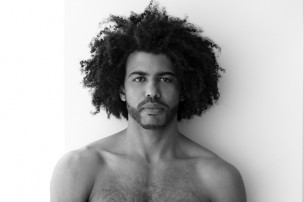
It may be apparent given the number of articles I’ve published on the topic that I’ve become consumed by a fascination with “Hamilton” in the past year. But Lin Manuel-Miranda ’02 isn’t the only genius behind the show’s success. Cue actor-slash-rapper Daveed Diggs, who plays the Marquis de Lafayette in the first half of the musical and Thomas Jefferson in the second. Diggs is charming and charismatic from the second he walks onstage, but it shines through most when he opens Act Two as Jefferson, returning from an oft-satirized trip to Paris and asking, humorously oblivious to the gravity of recent events, in leisurely swing jazz, “What’d I miss?”
It turns out, this charisma is more a testament to Diggs’ acting skills than his personality—Jefferson’s sometimes endearing, sometimes infuriating arrogance is something Diggs worked hard to emulate. In a July “New York Post” article, he says he channels his father and grandfather when he needs charisma: “At a party, they’re the guys you want to stand next to.”
Diggs, who joins Drake in the ranks of rappers my mother knows about due to their half-Jewish heritages, grew up in Oakland, California and was recruited to Brown for track, graduating in 2004. In an interview on Broadway.com, he urges, “Everybody without money should apply to the Ivy League.” After graduating, he couch-surfed (and, when he couldn’t find a couch, subway-surfed) around New York, attending auditions while living on unemployment benefits. Finally, Wesleyan graduate and director of “In the Heights” and “Hamilton” Tommy Kail ’99 offered Diggs an opportunity after a show by Freestyle Love Supreme, the improv rap-and-theater hybrid project that he co-created with Miranda, and of which Diggs was a member.
If each cast member in “Hamilton” has a specialty, Diggs’ would be rap: His talent and experience in the genre significantly surpass those of other cast members. His L.A.-based hip hop group, clipping., where he raps alongside William Hutson and Jonathan Snipes, combines experimental sounds (one of their songs is to the tune of a modified alarm clock) with irresistible beats and syllable-chocked speed raps. Diggs’ distinct tone echoes the jauntiness that he exudes in his role as Jefferson, and the half-conversational rap in the show also appears in clipping.’s music.
The most striking aspect of clipping.’s work, however, is how strongly you can feel their minimal beats throughout your entire body —more so than many of the blaring, invasive beats commonly heard in music today. The rhythm is usually bare-bones yet irresistibly catchy, and often created by an unconventional source, such as the above-mentioned alarm clock.
Sometimes the streamlined, beat-driven chaos of clipping.’s music completely falls apart, such as in “William’s Mix,” which consists of a series of arbitrary pieces of sound, as if one second was taken from each of fifty different tracks and the bits were lined up consecutively.
There’s also a level of intertextuality in their music: In “Dream,” a track on their debut album, “CLPPNG,” Diggs whispers a haunting rendition of Notorious B.I.G.’s “Juicy” over a muted, blended synthesis of bell sounds, running water, and jungle-esque bird chirps.
In terms of subject matter, it’s clear that “Hamilton” was certainly a more toned-down means of expression for Diggs, to say the least. Let’s start with the motto-like refrain Diggs raps at the beginning of a few of their songs: “It’s clipping, bitch” (which is also the URL for group’s website). Lyrics include “Twerk somethin’ girl” and “She don’t need you for shit but your dick and veins and your guts.” These specific gems aside, much of clipping.’s music seems to chronicle rough, violent street life, resembling something like a social commentary on the type of people forced into this way of life. Take the first two lines of “Or Die,” also on CLPPNG: “Guns on the table, mama in the back room/Bitches in the kitchen, water whipping crack foam.” The hook of this track dictates: “Everybody make a choice, it is not profound/Either get money or die/Get famous or die/Get that stainless or die/Get your hands in the sky or get it between the eyes.”
clipping.’s lyrics echo the same mixture of lamentation and pride that big names like Jay-Z often relay, but the stripped-down quality of the sound behind the lyrics somehow renders them altogether harsher, more authentic, and consequently more powerful. However, it wasn’t until the release of their latest track, “Knees on the Ground,” that clipping. explicitly acknowledged and emphasized the political aspect of their songs. Written in the wake of the Ferguson protests, “Knees on the Ground” is a vivid account of a white policeman shooting a black boy. Along with the track, which is sound-wise probably the most minimalist the group has ever gotten, Hutson posted a sort of disclaimer on the group’s Soundcloud that apologizes for taking advantage of this tragedy, recycling the trope of the white policeman killing an innocent black boy, and deviating from their usual claims that their music is based in rap, not politics.
The apology, however, seems unwarranted —the piece presents a powerful response to current events, and the detailed, visceral lyrics relay pure feeling—anger, frustration, hatred, fear.
One thing that clipping. and “Hamilton” have in common is that they both cut up tradition while honoring it. In the case of the former, while they see themselves as part of the entire history of rap music and culture, they constantly subvert it with experimental sounds and challenge many of its conventional aspects. Similarly, “Hamilton” retells a story revered in American culture, infusing it with diversity and modern music without ever renouncing its importance.
And in the midst of all this dynamism raps Daveed Diggs, in all his fast-paced, outspoken, charismatic glory.


Leave a Reply